Being evil sucks in Pathfinder: Wrath of the Righteous
I'm having second thoughts about my undead necromancer.
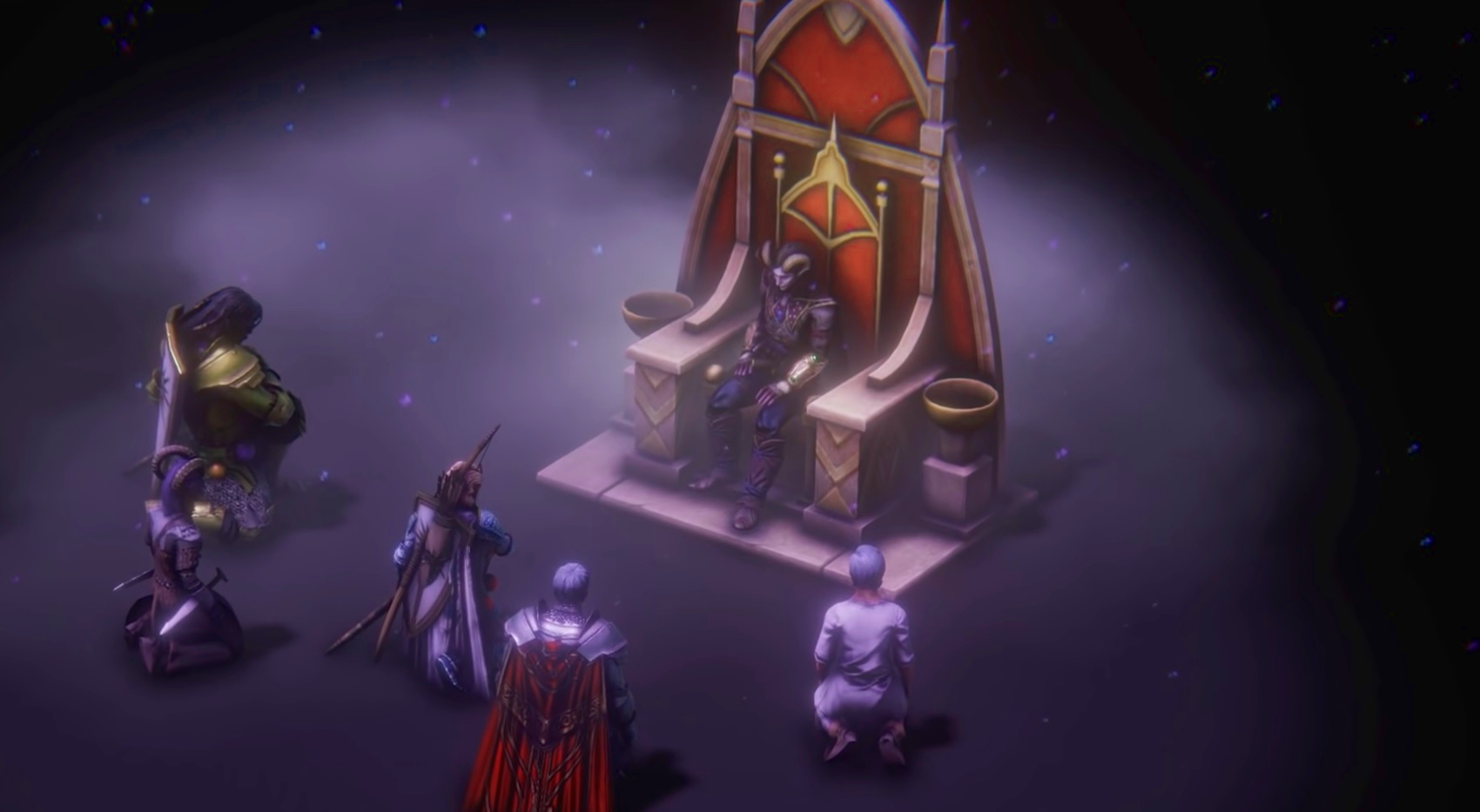
I have a tendency to play villains in RPGs. At least on my first run, and if I haven't decided to make a Chaotic Neutral weirdo. This means I open myself up to quite a lot of disappointment. For every KOTOR or Tyranny, with their nuanced approaches that manage to strike a balance between darkly entertaining and properly menacing, there are countless Fallout 4s, where allowing you to be a bastard is at best an afterthought. With Pathfinder: Wrath of the Righteous, an RPG that lets you become a lich or a demon, I had very high hopes. They've been utterly dashed.
The main obstacle Pathfinder puts in the way of prospective monsters is one shared by too many RPGs: you are a chosen one, a hero everyone seems to have faith in, and no matter what you do you're always going to have this reputation as a saviour. It creates a dissonance straight away, letting you act like a complete arsehole with only a half-hearted acknowledgement. Just murdered a bunch of innocent people in front of your kind paladin? At best you'll get a critical comment, but then it's back to saving the world.
Now, this is a vast RPG that I've only played for 30 hours, so maybe the consequences of my actions will come back to haunt me, but that possibility isn't much of a salve. I don't want to have to wait 100 hours for the game to acknowledge the way I'm roleplaying my obviously awful necromancer.
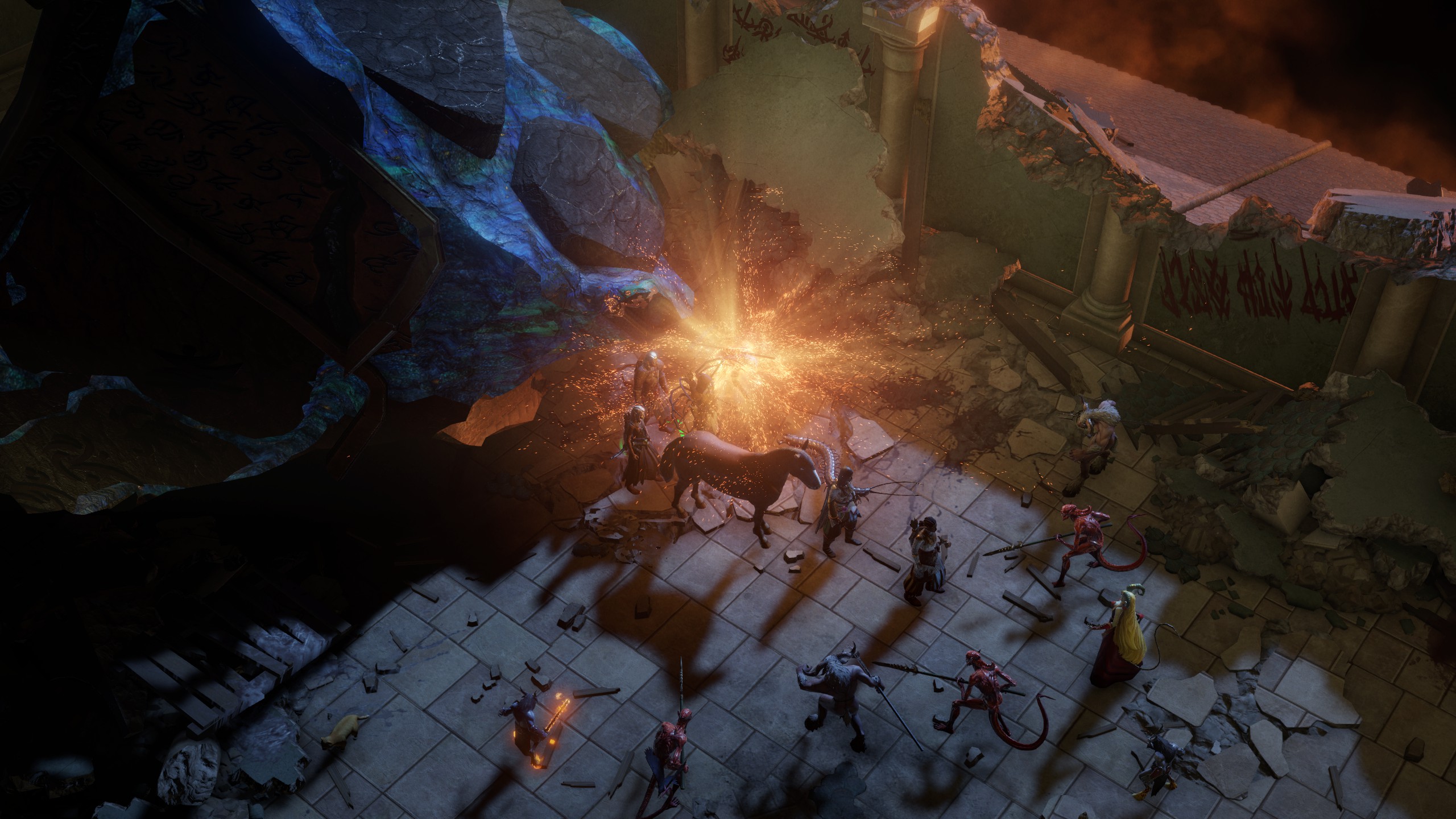
I could probably stomach the lack of reactivity a bit more if the dialogue options for evil characters were actually engaging, but Pathfinder has some of the most awkward alignment-based writing that I've seen in ages. Even though it uses a D&D-style arbitrary alignment system, that still leaves the door open to some nuance. There's a huge gulf between, say, Lawful Evil and Chaotic Evil, and on the surface this seems to be reflected, with Pathfinder letting you roleplay as someone very keen on the law who's still extremely evil. The problem is that none of these traits ever coalesce into what feels like a whole person. Instead, it's entirely inconsistent, making you act like a bootlicker one minute, and then an out-of-control, rampaging murderer the next.
It's entirely inconsistent, making you act like a bootlicker one minute, and then an out-of-control, rampaging murderer the next.
See, you don't get Lawful Evil dialogue choices. You get lawful choices. And then you get evil choices. At any one time, you can only embody one aspect of your alignment, and frequently these choices are entirely at odds with each other. And the options are often exaggerated to the extreme. There's so much that being lawful can mean, but Pathfinder gets rid of all the subtlety and can only really imagine one type of lawful character, one type of evil character, and none of them are characters I want to play.
Out of all of them, though, evil gets the short end of the stick. At least a lawful character reacts differently depending on the situation, even if they're still sticking to their love of rules and traditions. For the most part, evil choices don't deviate from the classic 'kill everyone'. I snapped a few examples, out of so many more, that you can see below.
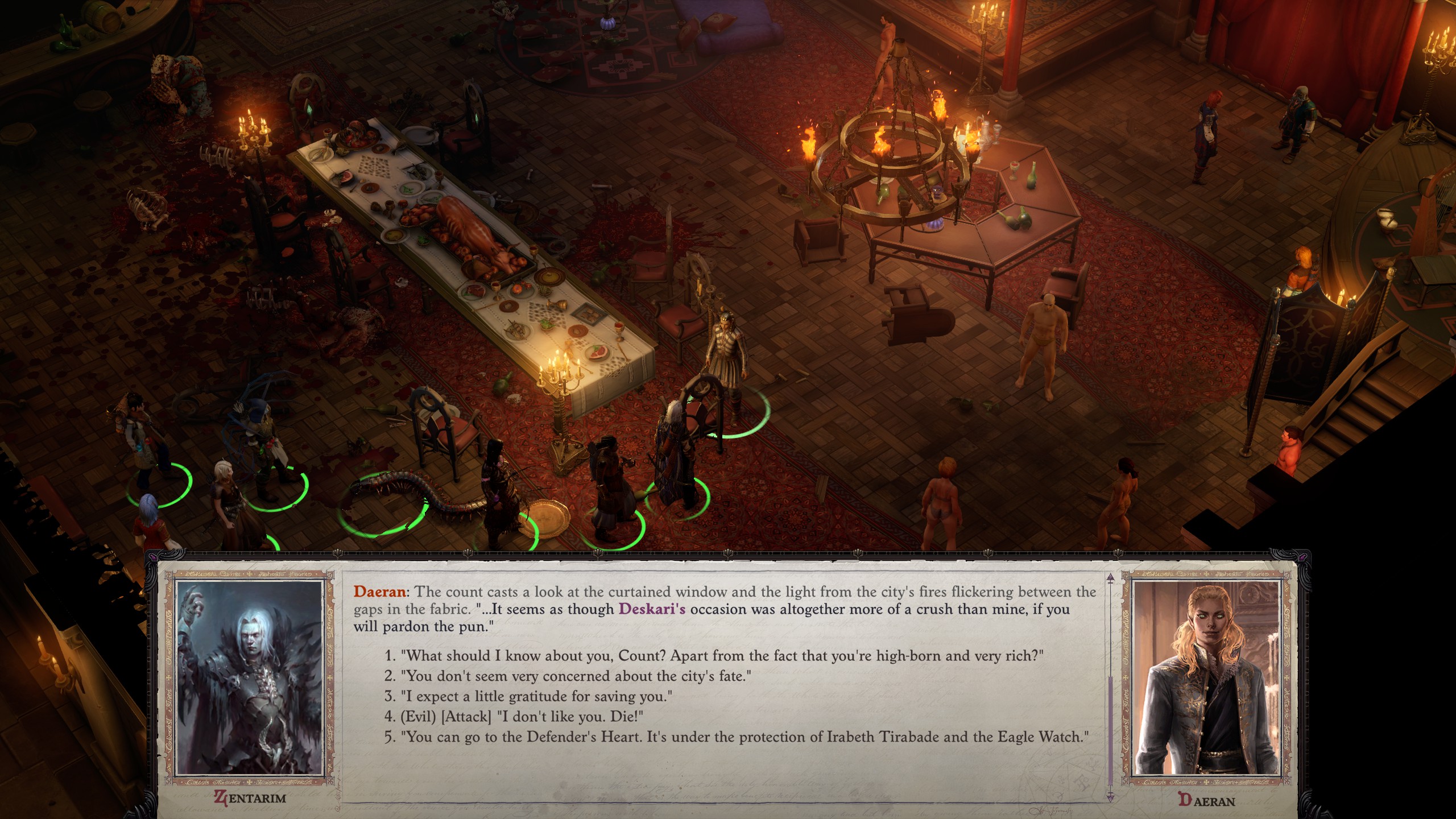
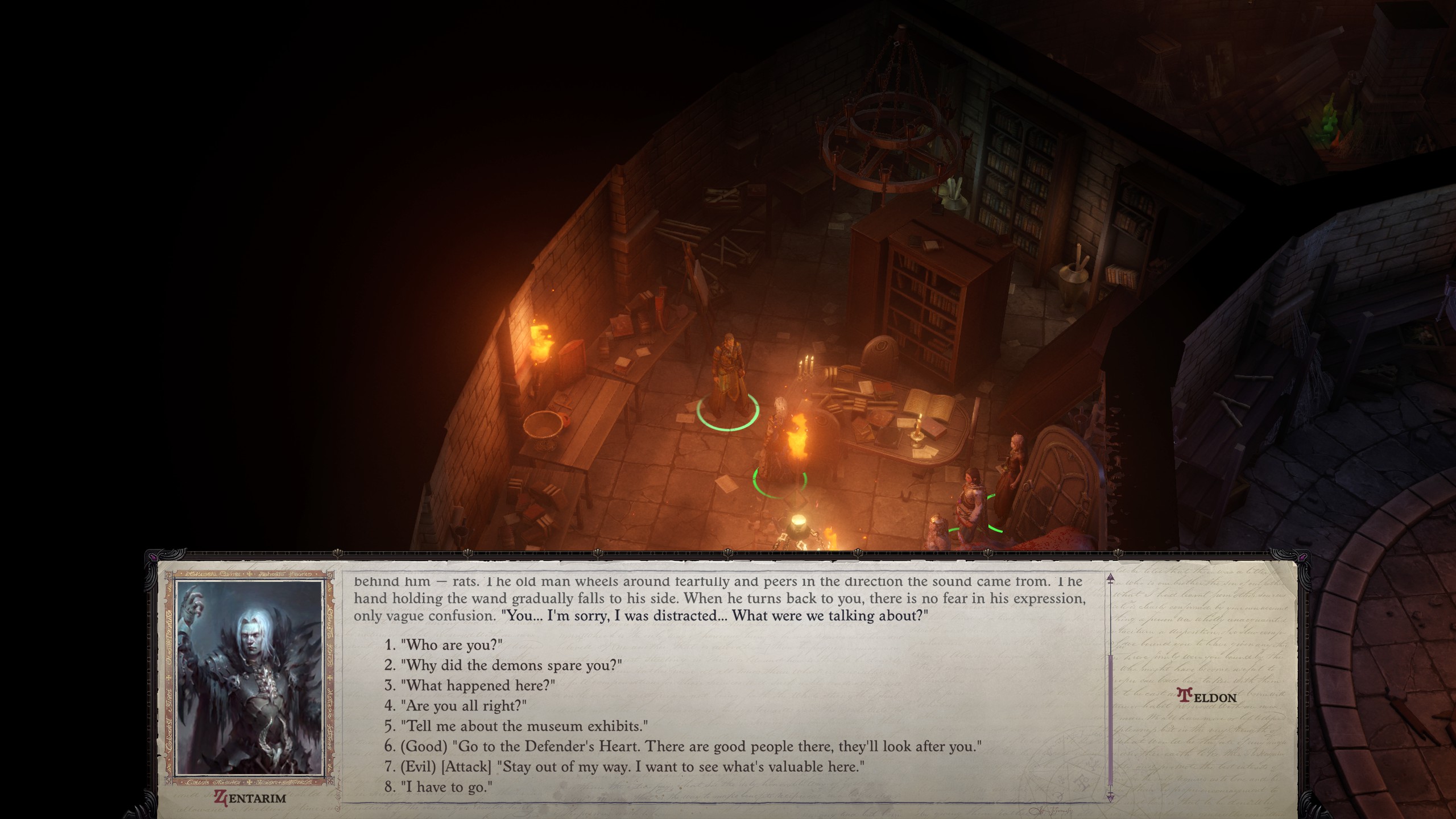
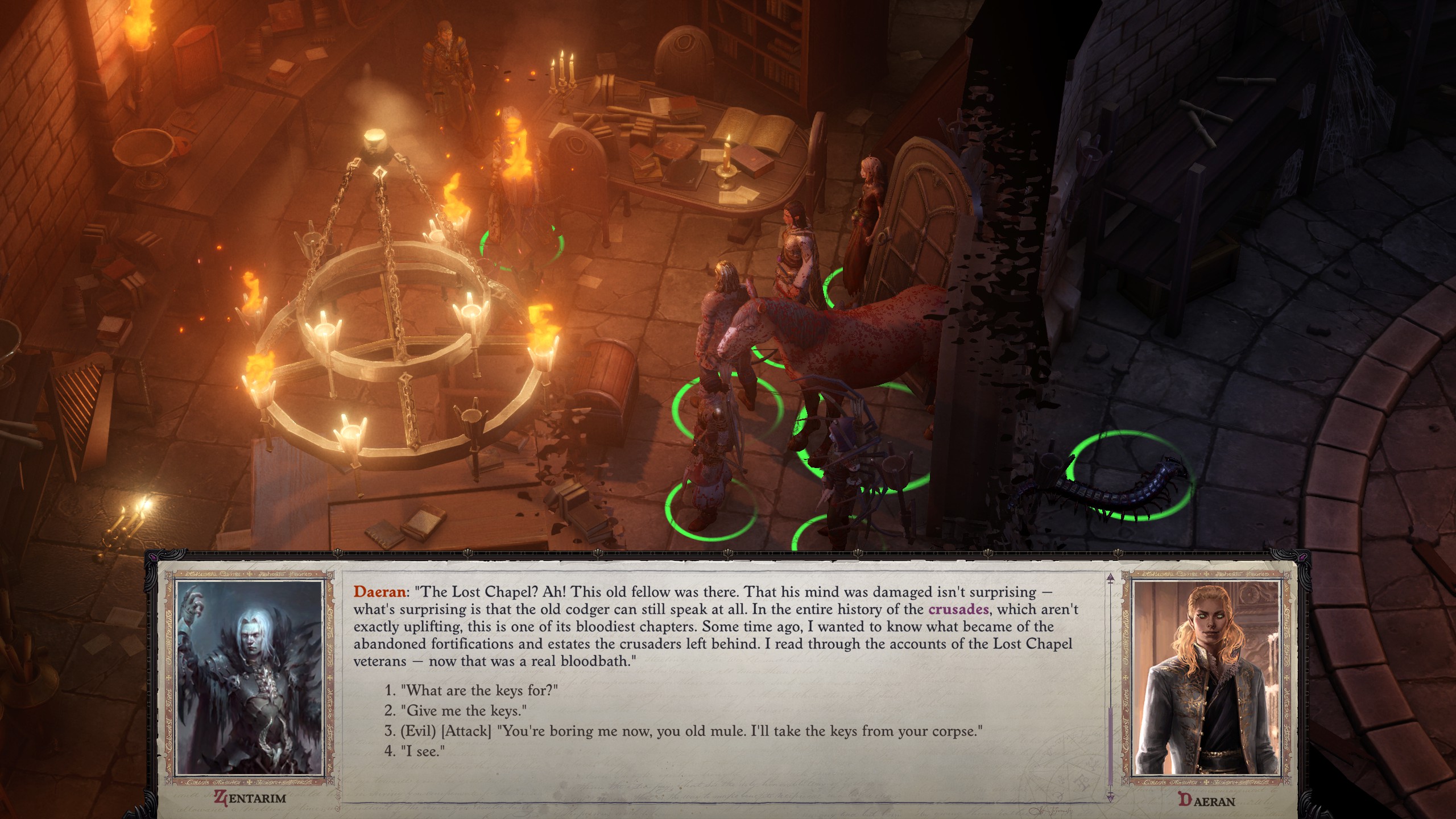
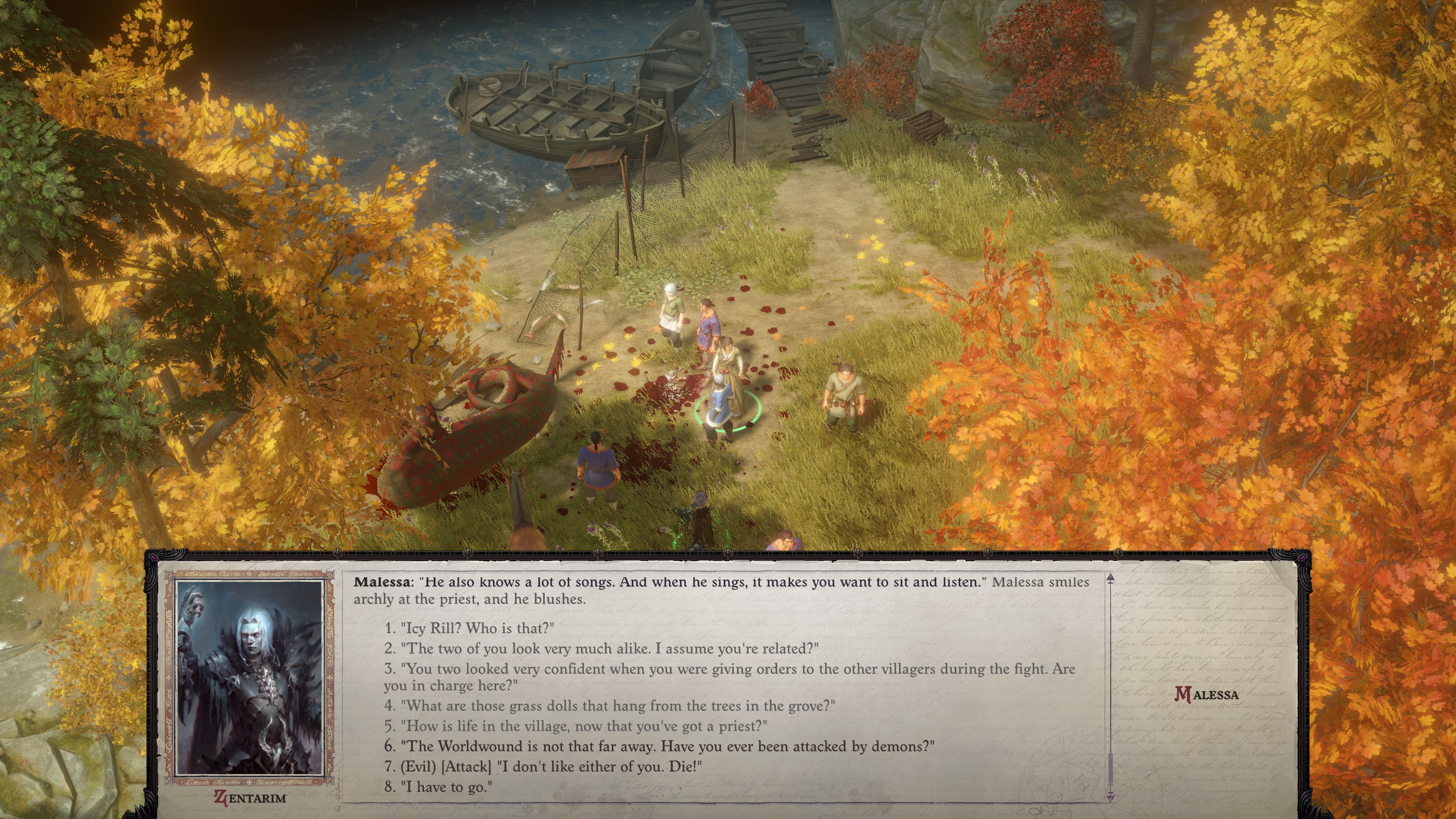
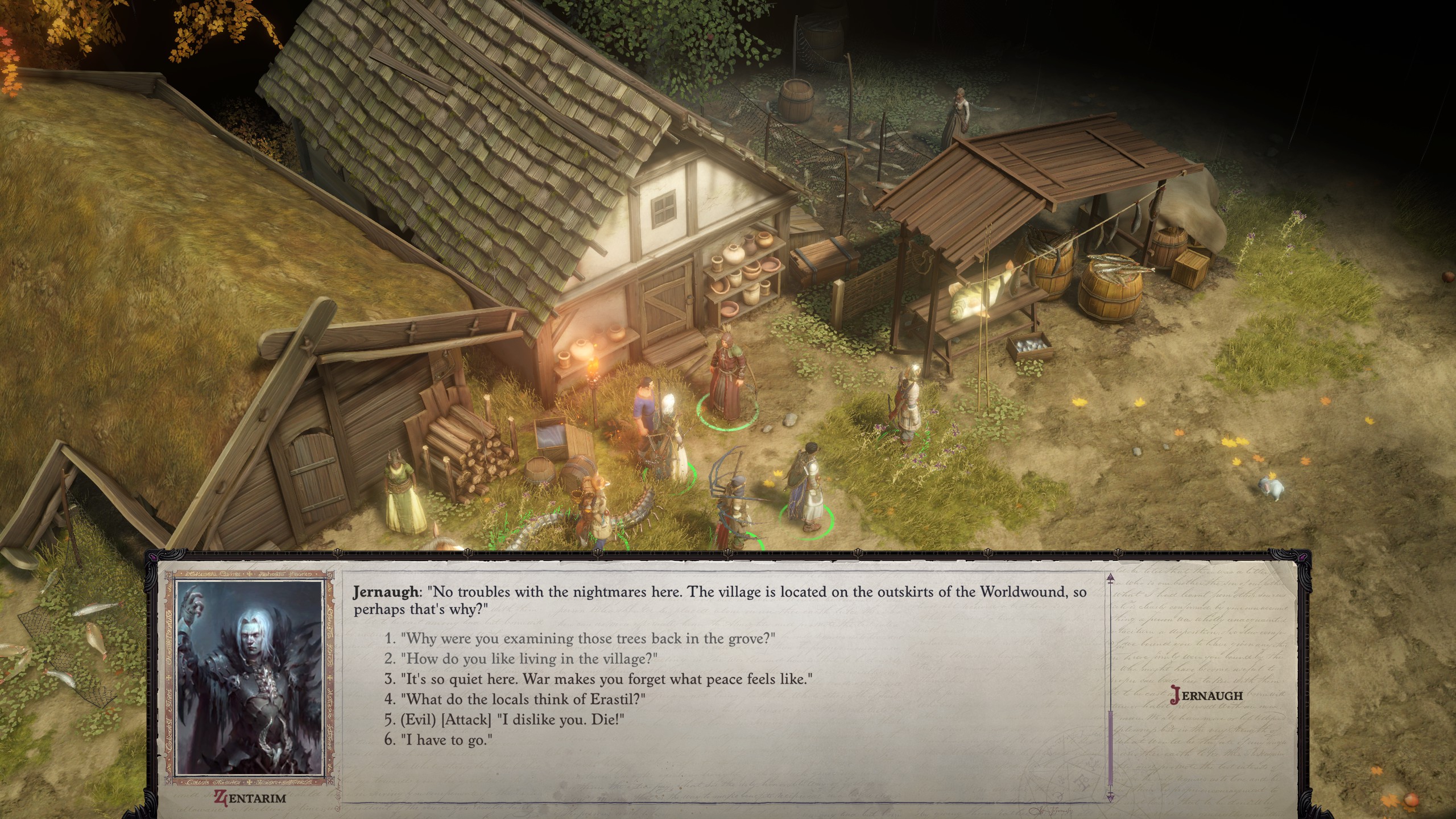
In only one of these examples does this choice make even the slightest bit of sense. It's the one where you can murder a man for his keys. But you can also kill him the moment he introduces himself, before you know he's carrying something you want. This is the evil solution to pretty much every problem: kill. And there's never any additional context. You've just decided you don't like them, so you murder them, right in front of your paladin pal.
Keep up to date with the most important stories and the best deals, as picked by the PC Gamer team.
This state of affairs is particularly frustrating because developer Owlcat chose to make these options so shallow. This has nothing to do with the ability of its writers, because I know they can write dialogue that captures a character's alignment pretty well. It's evident in every single companion. I've got a Lawful Evil gnome in my party at the moment, and nearly every conversation we have manages to express his nature. It was clear what his alignment was before I even recruited him. But it's impossible for me to roleplay my character that way.
I desperately want to become a lich and command a party filled with undead companions, but I'm also considering packing this adventure in and rolling a good or neutral character. This at least speaks to how much I want to keep playing. Though it sometimes devolves into overwritten, generic fantasy, it's a big improvement over its predecessor, Pathfinder: Kingmaker, and it manages to pull off some ambitious ideas where other big RPGs have failed. Like Dragon Age: Inquisition, you'll eventually be put in charge of an army, but here you get more than a castle and a meaningless title. You can recruit units, send them into battle and manage your burgeoning forces. The decision to include a turn-based mode on top of the real-time with pause mode is also very welcome.
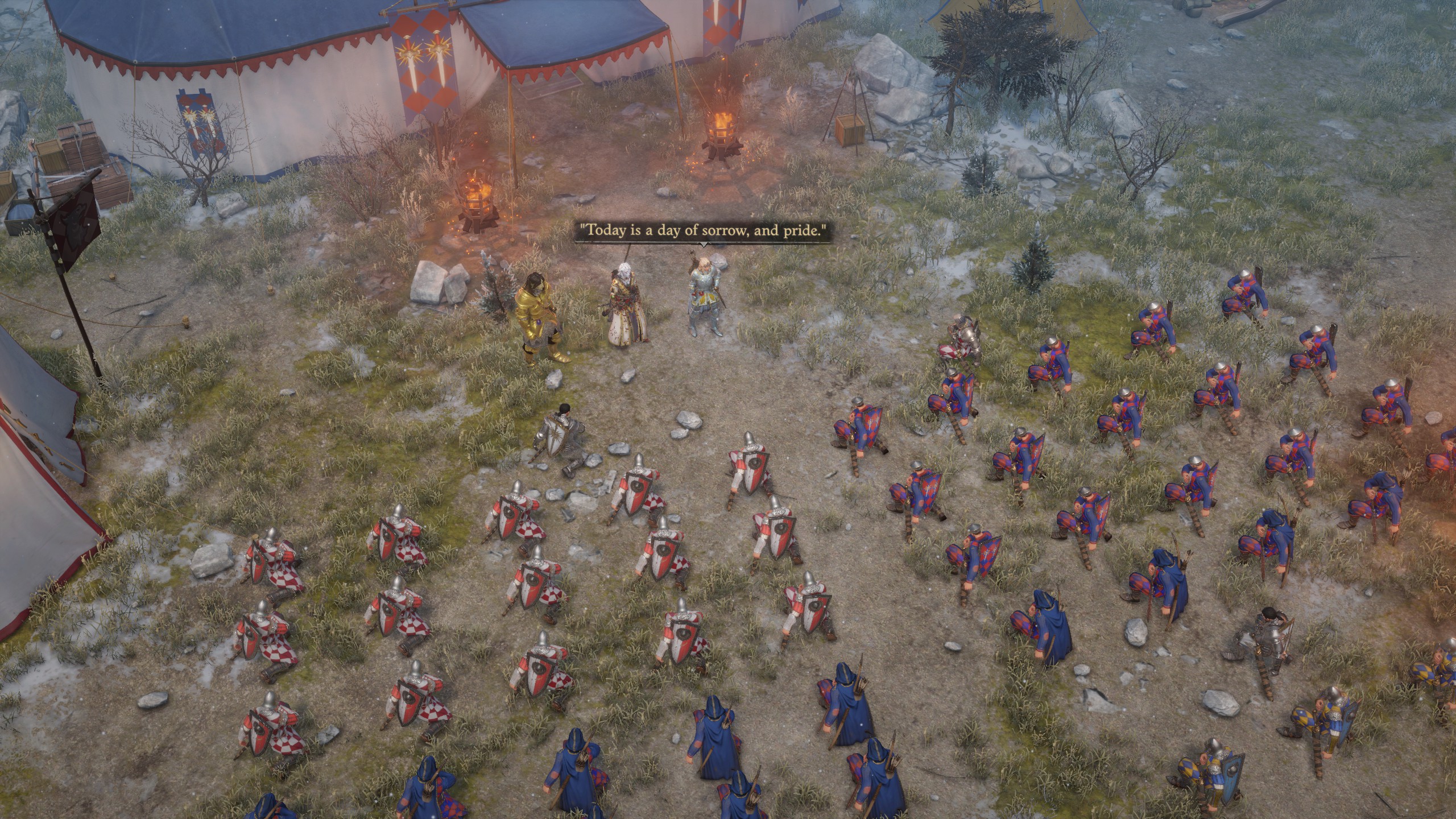
But the good bits, of which there are many, are never quite as satisfying as they could be, because I'm stuck playing a character I hate. And it's such a traditional RPG archetype: a cunning necromancer. I'm not asking to play some complex, tragic figure with more layers than an onion; I just don't want to kill everyone I meet. Of course, I can choose not to select the options where I senselessly murder strangers, but those are the only times I can build on my character's identity. It's murder or a blank slate. Those are my options.
While Pathfinder's approach to evil is particularly egregious, it's a common problem in choice-laden RPGs. Most don't just expect you to kill everyone, but you're almost always a rude, brutish arsehole. This makes a bit more sense than allowing the hero to become a serial killer, but it's still weird being the saviour of the world when you're acting like a school bully.
It's infuriating that RPGs are still struggling with this, because it's not something they've inherited from tabletop roleplaying, which frequently subverts heroic quests, and there are already solutions. It's noteworthy that the RPGs that do succeed in making playing a villain engaging are the ones that don't try to immediately paint you as a hero. In KOTOR you're an unwitting pawn of the Jedi, in KOTOR 2 you're an exile and in Tyranny you're a middle-manager in an authoritarian empire. The settings offer more natural flexibility and don't try to shoehorn you into a predefined role.
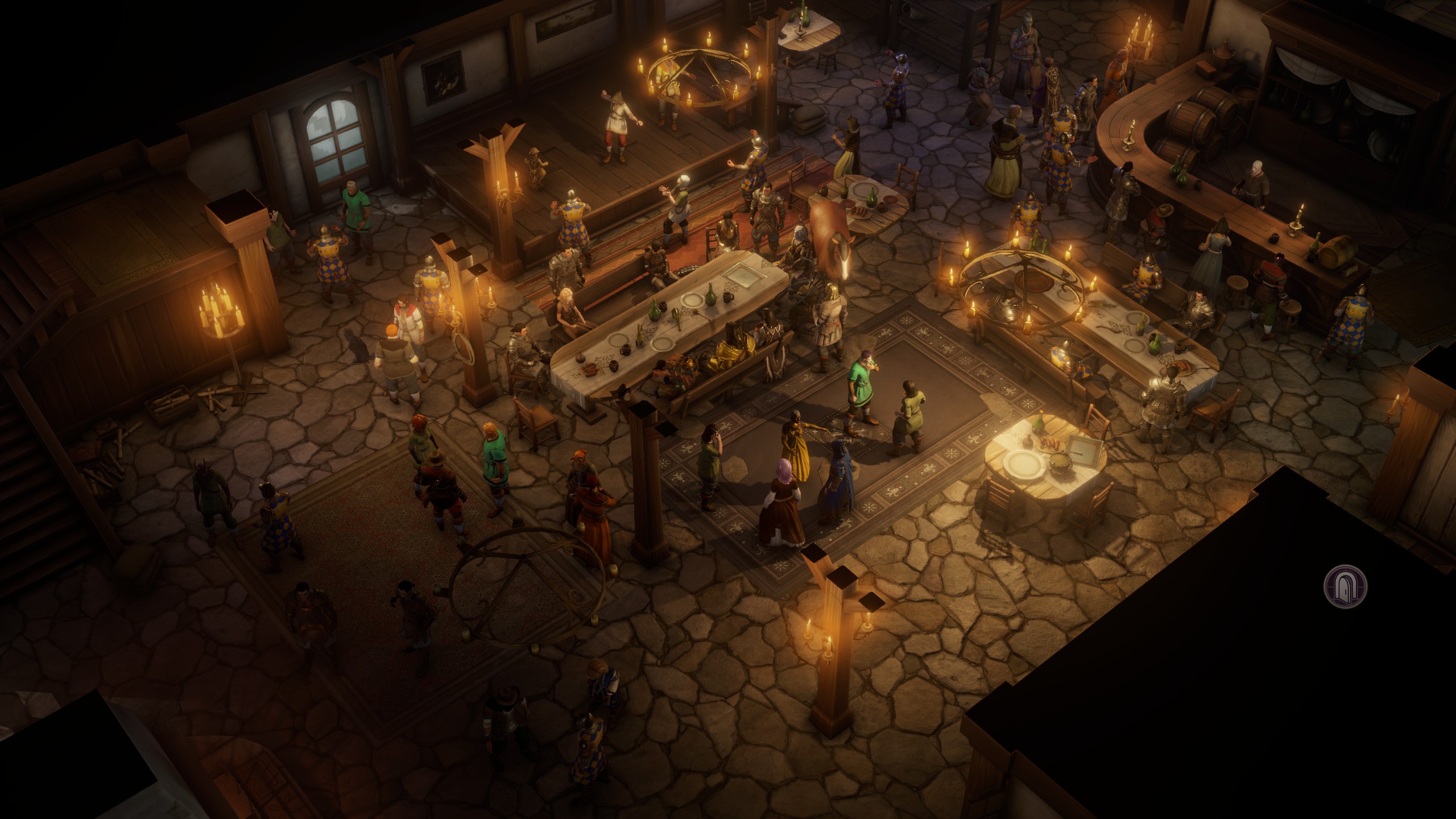
Or there's Mass Effect, which does away with the good and evil paradigm entirely. Sure, there's a lot of correlation between the Paragon/Renegade system and the D&D alignment wheel, but there's so much more grey and, crucially, context. Take the Rachni Queen decision in the original Mass Effect: you can choose whether or not to kill a creature and doom its species to extinction. Obviously evil. Except, this creature is also an illegal science experiment, and the last time the rachni appeared they almost wiped everyone out, inspiring the salarians to use the krogans to defeat them, who in turn rebelled and caused even more death and destruction. With that in mind, the decision becomes more complex.
Interesting choices are key to a good morality or alignment system.
Tyranny provides some of the best examples of evil in an RPG context, which makes sense, because it's one of the few RPGs where you are categorically not playing as a goodie. To be clear, though, it is perfectly possible, and just as compelling, to rebel against your authoritarian boss. You can be good in Tyranny and it's still great. But what it really nails is the decision making process. If you encounter a dying man, there might only be a couple of outcomes: you put him out of his misery or you leave him to die. But Tyranny then tries to take into account why you're choosing to do this. It's not the outcomes that are necessarily good or evil, but the reasoning behind them. So your options, then, are myriad, giving you the opportunity to really think about what you're doing, and fleshing out your character as a result.
Interesting choices are key to a good morality or alignment system. I don't want to play an evil character because I just want to kill everyone, or because I want to be an arsehole, or even because it's good to be bad. It's because I want to create some friction and tension within my party, or to be surprised by where my journey takes me. In KOTOR 2, I was able to transform nearly everyone on my crew into dark side villains through subtle manipulation and puppeteering, with a bit of help from the Force. It took time, investment and a lot of long, philosophical and sometimes heated discussions. I earned my team of monsters.
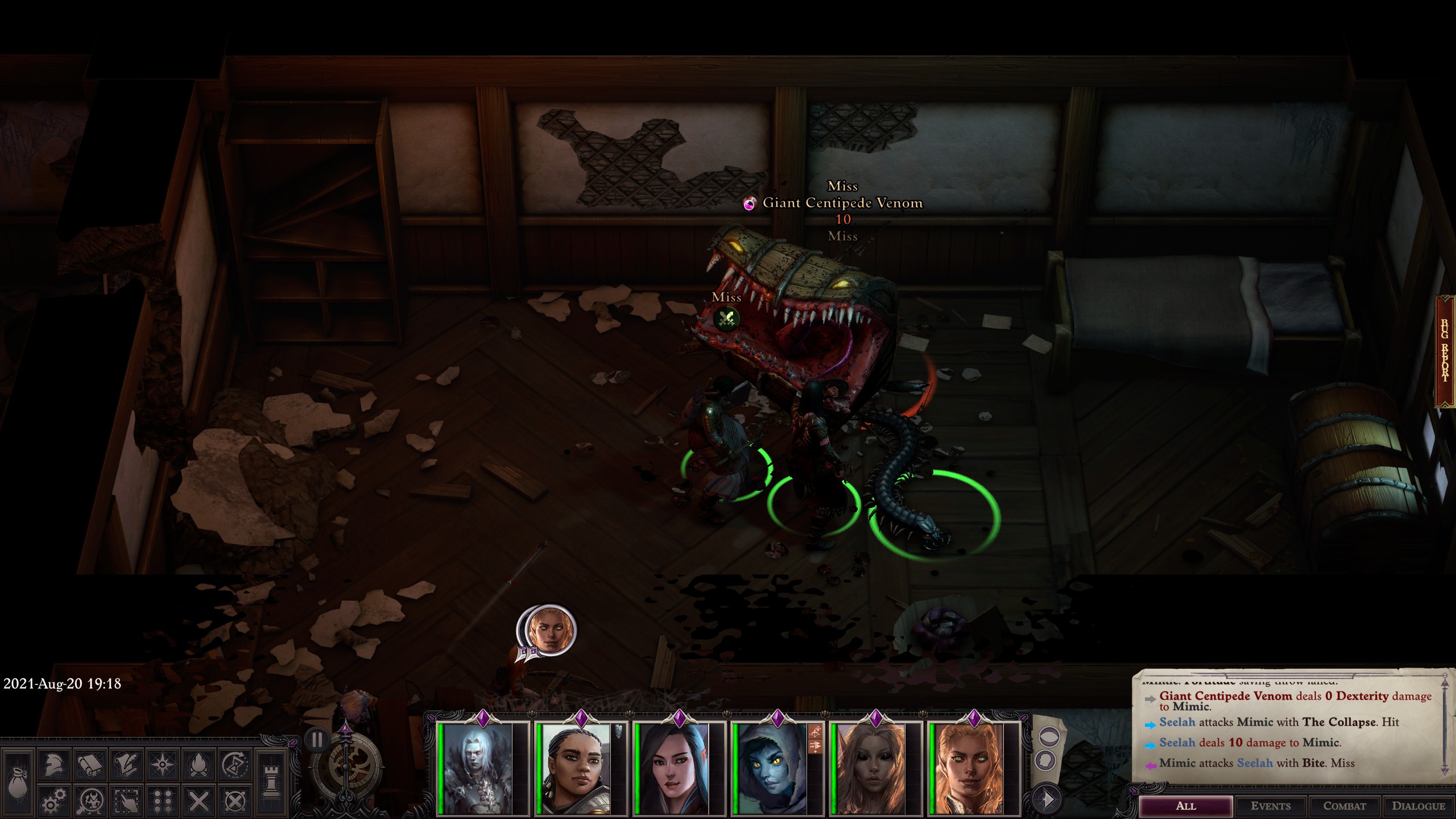
Pathfinder: Wrath of the Righteous is full of interesting choices, but they are mostly mechanical. What abilities to pick. What mythic path to start walking down. Do you want to be a dragon? An angel? And sometimes these decisions do intersect with the story, but typically only with a small nod—a reference here, a comment there. There are, of course, BIG DECISIONS that are well sign-posted, which offer the most dramatic roleplaying possibilities, but it's hard to build a character's persona based on just a few key events.
So if you're toying with grabbing Pathfinder and want to create an evil bastard, just make sure you're OK with the same old boring options. I'd advise you to not make my mistake, though, and just go with a more traditional hero instead. The alignment choices will still seem arbitrary and not especially cohesive, but they're a lot less jarring than the alternative.

Fraser is the UK online editor and has actually met The Internet in person. With over a decade of experience, he's been around the block a few times, serving as a freelancer, news editor and prolific reviewer. Strategy games have been a 30-year-long obsession, from tiny RTSs to sprawling political sims, and he never turns down the chance to rave about Total War or Crusader Kings. He's also been known to set up shop in the latest MMO and likes to wind down with an endlessly deep, systemic RPG. These days, when he's not editing, he can usually be found writing features that are 1,000 words too long or talking about his dog.

